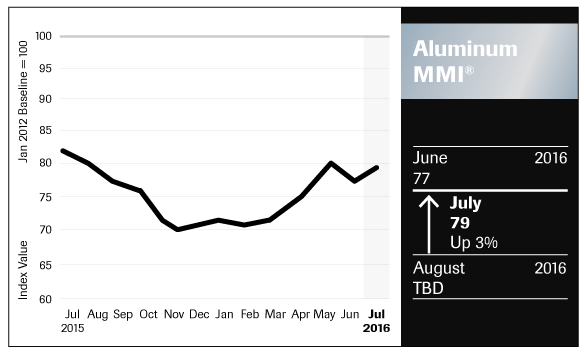Our aluminum MMI rose 3% to 79 points. Despite a stronger dollar following U.K’s decision to leave the European Union, aluminum prices continued to rise in June, finishing the month above $1,600/mt.
Aluminum prices have yet to make a significant upside move. Although prices have held well this year, we haven’t seen gains like in the cases of steel, zinc or tin. But the industrial metal complex is in bull mode since early this year, and that is giving aluminum a tailwind.
Overcapacity Still an Issue
The reason why aluminum is lacking that upside momentum is that overcapacity hasn’t really been addressed like in the steel industry. China has committed to stop the expansion of its steel capacity and has at least tried to actively and appropriately wind down “zombie enterprises” through a range of efforts, including restructuring and bankruptcy. That’s not the case when it comes China’s equally giant aluminum sector.

In June, China and the U.S. failed to reach an agreement on how to address excess global aluminum capacity. Although aluminum and steel markets have some similarities, there are also some key differences that explain China’s willingness to engage with its steel critics but not its aluminum critics.
First, China’s steel industry represents an old economic model that keeps losing money due to poor profitability. In contrast, China also has some of the most modern and low-cost operating aluminum smelters in the world, although China’s aluminum industry has its own loss makers, too. It’s understandable that China is more focused on getting rid of old, high-cost capacity in its steel industry, rather than removing its new generation of aluminum smelters.
Second, China wants to achieve market economy status in the World Trade Organization. But this goal is jeopardized by steel organizations and policymakers unhappy with the prospect of even heavier Chinese exports and less freedom in dealing with them.
The U.S.-based trade body Aluminum Association has also been fighting against China being granted market economy status, but it’s mainly doing it alone. The aluminum sector is simply not as important for European and U.S. politicians as the steel sector.
On the other hand, the International Trade Commission (ITC) launched an investigation into the global aluminum trade to impose tariffs of up to 50% on primary unwrought aluminum. This proceeding could have a significant impact on global aluminum producers, particularly from China, and U.S. importers and users of aluminum products. The ITC will likely release its findings any day now.
This trade case is something to watch in the second half. It could be the tipping point from which China starts tackling the aluminum overcapacity issue for real. The demand side of the equation is just as important. Furthermore, China’s stimulus measures later this year would continue to support demand for aluminum, while investors could be disappointed if China fails to spur growth.
